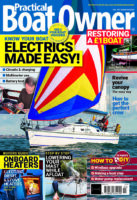New RYA-RNLI joint video series aims to reduce the number of call-outs for the RNLI starting with the biggest culprit: machinery failure
The Royal Yachting Association (RYA) and Royal National Lifeboat Institution (RNLI) have joined forces to produce a new series of ‘How to’ videos with advice and tips on how to safely enjoy being on the water.
According to a recent press release, the RNLI were called out more than 13,000 times to boaters between 2017 and 2019 – nearly 9,000 times in 2019 alone.
1. The top reason for an emergency call out in the last two years involving a boat was machinery failure, with more than 4,000 incidents: engines overheating, contaminated fuel, faulty filters, faulty belts and blocked impellers. “Prior to going out on the water always make sure you complete an engine and machinery check including belts oil bilges, coolant, strainers, air filters and seacocks,” says Ros Cameron from the RNLI safety team.
2. Equipment failure is the second most common reason for calling out the RNLI: “Since 2017 we’ve had almost 2,000 calls related to equipment failure,” says Ros Cameron. “Loss of power, halyards shrouds and mass breakages as well as steering and rudder failure. Look after your boat yourself and your crew,” she adds.
“Although you can’t plan for every eventuality,” says Steven Warne, also from the RNLI safety team, “You can mitigate against this by checking everything thoroughly before heading out on the water. Equipment should be serviced at recommended intervals and you should think about carrying spares for small repairs that may get you home.”
3. Running aground (871 launches): missed the tide, misread the chart or just plain unlucky. The advice from the experts is to check your echo sounder is working properly and make a solid plan.
4. Human error (524 call-outs) includes errors in navigation and poor voyage planning plus inexperience and incompetence. “Have a plan and know your limits,” adds Cameron.
5. Sinking was the 5th most common reason (200 callouts) – most often problems with the coupling from the propshaft to the gearbox, problems with a flexible stuffing box, exhaust and skin fittings
Stuart Carruthers, RYA Cruising Manager, said: “Following lockdown the water has been re-established as a fantastic place to exercise, relax and re-charge in the great outdoors. However, it is important to remember the seriousness of safety when going afloat, especially if you have not been on the water for some time or are using new equipment for the first time.
“We hope that viewers will take away from the videos the significance of planning for different eventualities, thinking ahead, getting properly trained and always having a method of keeping in touch and if it comes to it, calling for help when out on the water.”
Samantha Hughes, RNLI Water Safety Partner, said: “We want everyone to enjoy their time on the water whilst staying safe. By highlighting the common call outs our volunteer lifeboat crews attend as well giving some top tips we hope it will get viewers thinking about what they could do to maximise their time out on the water.
“Before you head out on the water make sure you are prepared and have checked the weather conditions, wear a lifejacket and make sure you have a means of calling for help should you need it.”
RNLI facts and stats
The RNLI supports over 238 lifeboat stations and over 5,500 volunteer operational crew.



